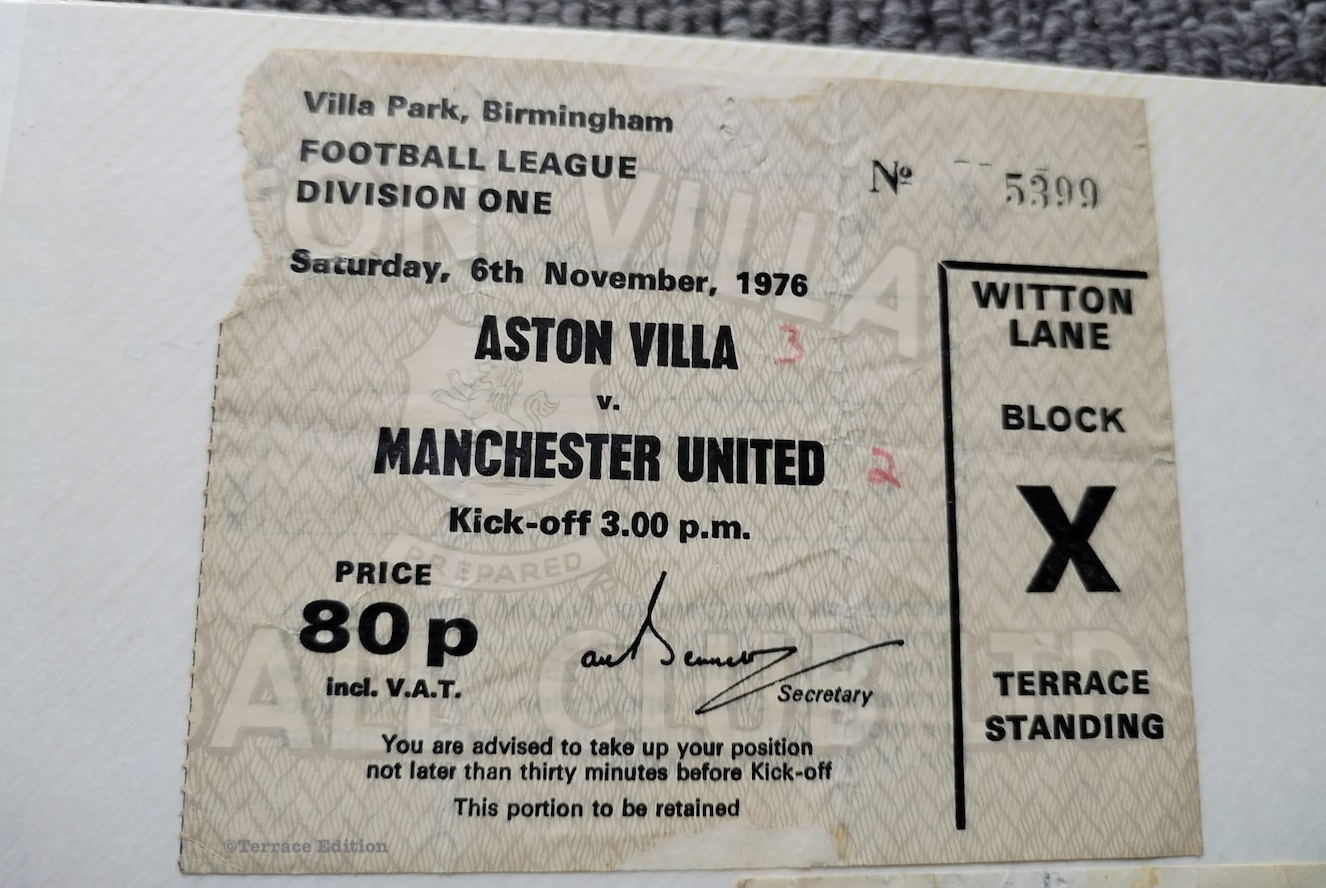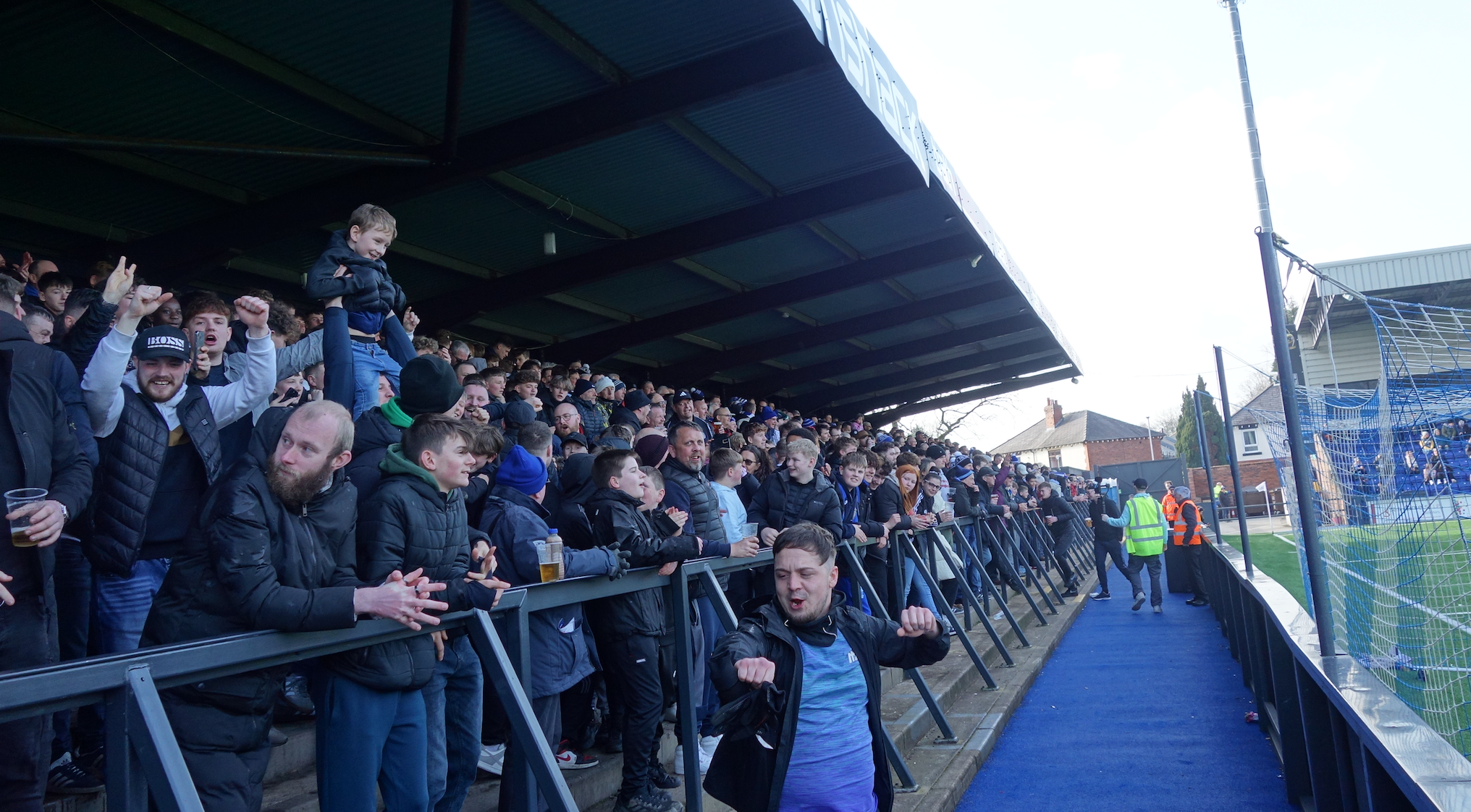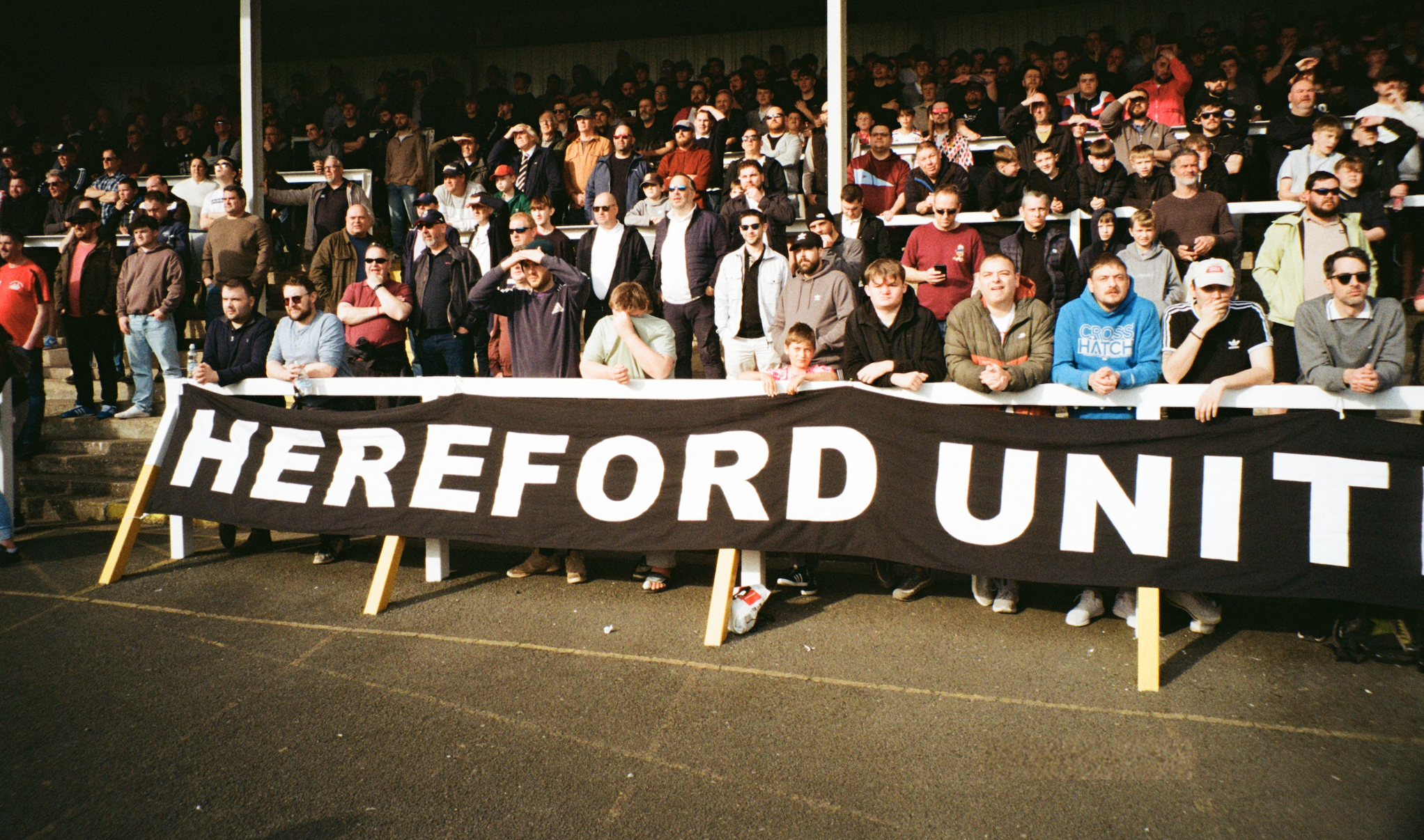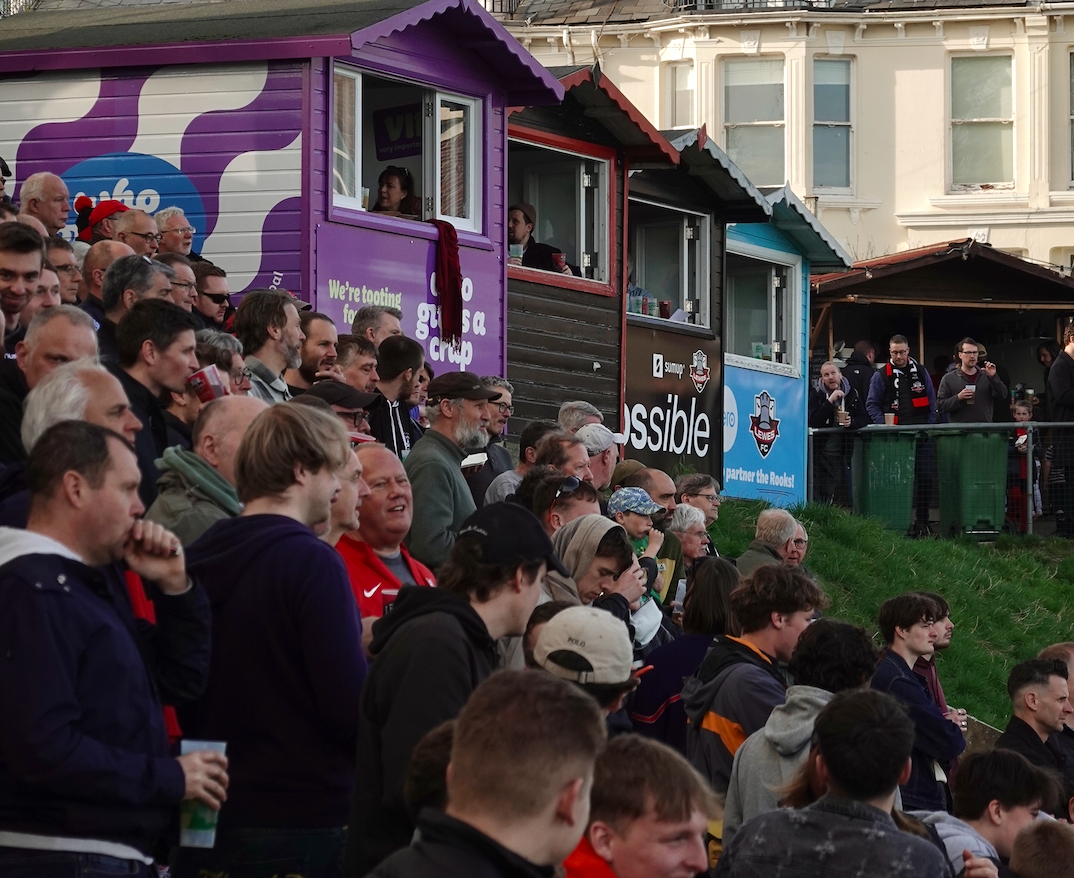Never mind the banners

Words: Tom Reed
Images: Tom Reed
June 2013 and a warm day in London’s Hyde Park. The tourist and the picnickers were startled by an assembly of football fans carrying all manner of banners.
The banners were reminiscent of the ones you’d see on the Kop or the Trent End back in the day, but these pieces of fabric carried carefully painted slogans like “Working Class Game, Business Class Prices” and pictures of sobbing supporters with their pockets turned inside out.
The march made its way towards Gloucester Place and to the doors of the Premier League, whose CEO at the time was the impossibly slick Richard Scudamore.
The protest took balls and it felt like supporters were finally onto something in trying to stop the “price elasticity” of the sport, whose demands for more and more in the form of ticket prices never seemed to snap.
Three years later, a £30 cap was announced for away ticket fees in the Premier League, which felt like a small win at the time but now seems like a concession, and of course, meaningless for the protesters from the countless leagues below the top tier in England.
After that, little on that scale, it seemed. The cry of “Twenty’s Plenty” got lost in the ether like a terrace chant that not enough people joined in.
Until last week, that is, when supporters’ banners emblazoned with “Stop Exploiting Loyalty” were seen in the stands at Manchester United and Liverpool.
Kieran Maguire and Henry Winter, are two charming heavyweights on football governance matters, they’ll lull you into a false sense of security before caressing wrong ‘uns with a straight right.
When the pair post on social media on a matter, you know the thing they are tweeting about is a thing.
Maguire and Winter posted on X on the new Manchester United furore, which was summed up by Manchester United Supporters’ Trust as the following:
“Tonight the club informed the Fans Forum of changes to certain ticket policies that will take effect immediately. The Club has indicated that it will post the details of these changes online but the headline is that, with immediate effect, all Members tickets for the remainder of this season will increase to £66 each, and that this price will apply for kids and over-65s as well as adults.”
Now, charging a child and a pensioner £66 a ticket would seem harsh in a cost-of-living crisis even at a club where your old-school supporter is less legacy fan and more of an antique concept, like trying to explain what a cheque book is to said children.
Manchester United fans being up in arms at the commercialisation of the Old Trafford club is a bit like a drinker standing in a city centre activity bar, that used to be a local pub, and asking what’s happened to the mild on tap and the cheese cobs, while someone called Giles prangs a basketball off the arcade game hoop and through a window.
And while, if you see protesters with a banner, you should always stand with them and hold the bloody thing up, as football supporters, we do need to ask ourselves why we are back wafting fabric some 11 years since the last round of protests?
Loyal fans having to bargain with billionaires.
©Karl Hanssens/ Terrace Edition. Stamford Bridge. Chelsea FC. 1988. £5.00 entry.
There’s only so long that supporters can roll out the bedsheets and wet the end of their dried out Sharpies before looking introspectively at the so called supporters’ movement in England and ask how we have arrived at the most commercialised, most television dominated version of football in the world.
One where the poor are effectively locked out of the sport which might give them some enjoyment in life and where fans with just enough money to get by are relieved of it to fund lifestyles of footballers that are out of reach to us.
Of course, we, as supporters are at an inbuilt disadvantage to price gouging, because football is good and even even in 2024, with an array of leisure activities available, nothing compares to the visceral buzz of going to the match.
What else is there to do on the Saturday? Just look at the faces of the husbands and partners who have taken a “week off from football” to spend with their other halves in HomeSense and see a living Edvard Munch’s “The Scream”.
The match-day ritual is also an obstacle in producing any sort of wide-scale militancy.
Let’s face it, most of us hate our jobs and the daily routine so much, that the ritual of match-day becomes an empowering act. I am going to do something for myself and all that stuff that creates footballing dopamine for us dopes.
It’s also, by character, crowded at matches so when you get a seat in the pub and a nice pint, you’re not moving for anyone.
So, if someone has organised a protest, say on ticket prices, the tendency is to sit on your fat arse and say “I’ll go to the next one”, then realising you said you’d do that to the “sack the board” agitation of 1984 and never did.
Removing English fans backsides from pub seats should come on the NHS.
Rival culture has also proved problematic in building solidarity across the game. How is it that the football media don’t really like lad culture, the popping of pyro, pitch invasions after a goal etc etc but big up rivalries in football to the nth degree?
©Karl Hanssens/ Terrace Edition. Old Trafford Manchester United. 1988. £3.00 entry.
Fans are conditioned to dislike anyone that doesn’t come from their town or their side of the city, in some cases.
Solidarity is frowned upon and the “I’m alright jack culture”, which came with Thatcher has never really gone away.
In some cases selling a kidney to get a ticket and negotiating the Dickensian transport system for a 6am return from an away day is seen as a twisted badge of honour. Football’s Stockholm syndrome and yeah “I’ll follow the team to Sweden mate, I’ll work the rest out later”.
“Is that all you take away?” has long been a chant aimed at people who are basically exactly the same as you and probably haven’t got a one-er to spank on a trip to Barnsley.
When your rival is on the verge of going bust, you celebrate it, rather than realising you’ll lose those generations of hatred and will instead have to create banter with 250 fans from a club that means nothing to you..
A lack of leadership has also blighted the English supporters’ scene.
In almost every sphere of society, leaders emerge, be it Mick Lynch of the RMT who basically fronts it for the train drivers and tries to speak sense on matters pertaining or Susie Dent off Countdown who is lary when it comes to etymology.
However, among football fans, not a single leader has emerged since the late Brian Lomax who can channel the energy of the country’s most popular game into something that puts fans front and centre.
While there’s no Robin for this particular set of hoods there’s no fans’ organisation that can combine the requisite soft power bureaucracy with the militancy that gets real results.
You’ll see the Football Supporters’ Association logo on the “Stop Exploiting Loyalty” banners in the stands at United and fair play to the people that got those in. But banner protests alone are disposable and don’t really effect the corporate world of those that control the game.
Holding up banners in 2024, 11 years after after the last banner protest could indicate that the tactics haven’t moved on much since then, or indeed from the time of the Suffragettes who were handy with a strip of cotton.
It’s not the Football Supporters’ Association’s fault that they have to front the situation when they can, but the fact that there is not another fans’ collective bringing up the rear speaks of the stagnation of the English supporters’ scene.
©Karl Hanssens/ Terrace Edition. Bloomfield Road. Blackpool FC. 1991. £5.00 entry.
The Premier League and FA should be funding many things but not the sole supporters’ organisation in England as they do with the FSA, who received a fair whack of their funding through the Premier League Fans Fund.
Moreover, The Premier League-centric nature of the banner protests, ( the 2013 march was organised by Liverpool’s Spirit Of Shankly) and the protests in the stands at Old Trafford and The Etihad, create the unintended feeling that ticket prices are a Premier League problem only.
This is far from the case, and you’ll see fans aghast at entry fees right down through the Championship to leagues 1 and 2, while not enough research is being done on non-League ticket price inflation and the effects of fans being priced out of the top tiers and taking their bunce lower down.
A wide-scale protest on ticket prices organised across all four divisions and beyond, targeting the sponsors of the leagues and governing bodies (in a legal manner) and piercing the corporate bubble that surrounds the game, could have a massive impact with the Premier League under scrutiny for the Man City business.
Will it happen? No. Something will come around to kill momentum and drive our rears back to the upholstery of public houses. Blame it on the international break if you want.
The problem is that as a whole, as fans we want to have our over-priced meat pie and eat it.
We generally don’t like turning up to grounds and paying too much to go through the turnstiles but nowhere near enough effort of focus is put on achieving a seat at the table at decision making level.
Despite the success of the German 50+1 model and brilliant fan-owned clubs such as Exeter City and AFC Wimbledon, fan-ownership remains an alien concept in England.
Fan-ownership just doesn’t mean democratic running of clubs, it means elected supporter representatives on the boards of all the top governing bodies such as the Premier League, EFL and Football Association.
©Karl Hanssens/ Terrace Edition. Highbury. Arsenal FC. 1988. £5.00 entry.
Without a seat at the top table? How will fans ever be able to help shape the game into one that is affordable and therefore workable for the people that sustain it.
So long as supporters buy into the “pay your money and shut up" system then the ticket price crisis likely to continue.
Brian Lomax was a Northampton Town supporter, and fan-ownership pioneer who set up the first supporters’ trust at the Cobblers in 1992 and whose mantra was very clear “no money without shares.”
Unfortunately, within three years of Lomax’s sad passing in 2015, his work had been betrayed and Supporters Direct, the single issue fan-ownership organisation he helped set up had been merged which was then known as the Football Supporters’ Federation to create the Football Supporters’ Association.
I spoke to Lomax at length before his passing and he was very clear that Supporters Direct needed to remain a single issue organisation, focused and driven to help more and more clubs into community ownership.
Instead, Supporters Direct was forced to merge with the Football Supporters Federation due to a ”funding crisis” at a time when the game was awash with money. The move made no sense and still doesn’t.
On the FSA website in the “Our work” tab, you’ll find “Supporter Ownership” ninth in a list below Climate Crisis and Club Liaison.
Meanwhile, the Northampton Town Supporters’ Trust, along with 14 other trusts have written to the Government to express their concerns over the rise of “Supporter Advisory Boards” which do not have the written constitution or democratically elected directors of supporters trusts.
Currently, the Football Governance Bill is subject to what proponent and ex-MP Tracey Crouch calls a “wrecking amendment” in the Lords, making the last gasp panacea uncertain medicine for the game.
The fact that an Independent Regulator is even needed shows just how bad things are.
©Karl Hanssens/ Terrace Edition. Loftus Road. Queens Park Rangers. 1988. £5.00 entry.
Yet, although we’ve talked about the lack of leadership and taking an introspective line, let’s not forget that the “middle-classification” of the game was seemingly done by design and in plain sight.
Indeed, the Football Association’s 1991 “The Blueprint For The Future Of Football” document extended to some 124 pages but contained a killer paragraph or two which summed up its intentions.
You can read more about the blueprint here and the long betrayal of poor football fans here.
Of course, if we are talking about introspection then we should also come up with some talking points about what can be done about high ticket pricing.
In left-wing circles there has long been a debate about workers from overseas, their membership (or lack of in trade unions) and the effects on wages.
In football similarly, the effect of football tourists on ticket prices and the bargaining power of English supporters has been a talking point.
Football is a global language and English fans have always been at the forefront of what is now known as groundhopping in Europe and beyond.
We are used to paying city taxes when we travel to Paris or Berlin and Venice has implemented a tourist tax, so should we therefore ask fans from overseas to pay a levy when buying tickets here? With the proceeds going back to subsidising cheaper tickets for those who live around and contribute to the communities where clubs are situated.
That brings to the fore the idea of a “living ticket price” much like the notion of a “minimum wage” moved to a “living wage”. Just how much are liveable ticket prices for a game which dominates a nation and how can we achieve them?
And yet perversely in a country obsessed with “taking back control”, there is little to no interest in having a real say in how the game is run. Supporter Ownership has plateaued and modern representation of fans on boards as stakeholders has been sidelined.
We’ve not organised properly, not been militant enough, not worked for community ownership of clubs nor representation at decision making levels in the game, not supported breakaway clubs like FC United of Manchester in enough numbers, not shown solidarity with Germany and Sweden, who have far more functional systems than us. Not been led or led from the front ourselves.
Not said enough when the prices through the turnstiles have gone up and up and up. We’ve watched on too quietly as the game has been moulded by elites and overseas investors.
“The game’s gone” people say, but did we hold on tight enough?
Have we fucked it lads?
There will likely be isolated protests in ten years time, when pints have passed the £10 mark and when dynamic pricing means the prices of entry to the people’s game, goes up in front of your eyes.
©Karl Hanssens/ Terrace Edition. Manchester United away ticket 200. £27.00 entry
©Nigel Bishop/ Terrace Edition. Aston Villa vs Manchester United. 1976. Entry 80p.
Tom is Terrace Edition Editor and can be found on X: @tomreedwriting
Thank you to Karl Hanssens for use of his his photos and ticket stubs.












